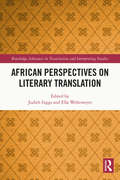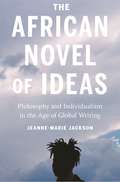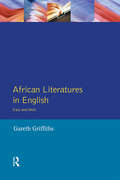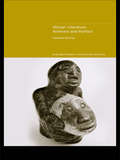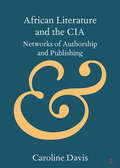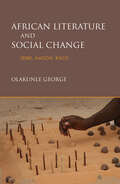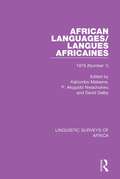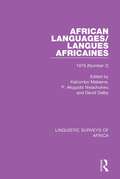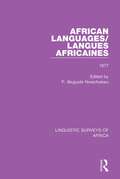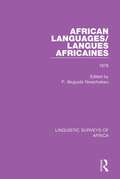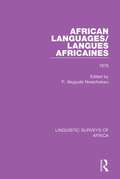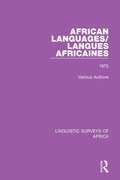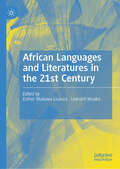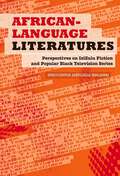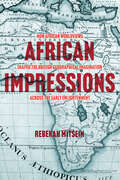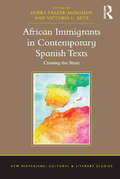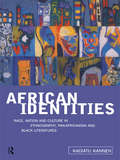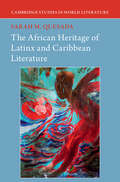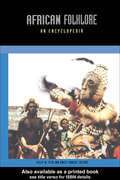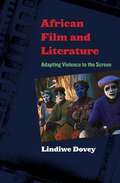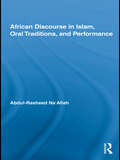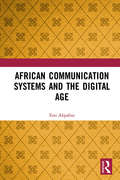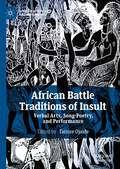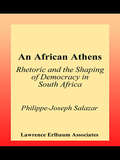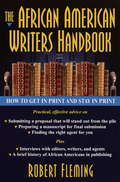- Table View
- List View
African Perspectives on Literary Translation (Routledge Advances in Translation and Interpreting Studies)
by Judith Inggs Ella WehrmeyerThis collection serves as a showcase for literary translation research with a focus on African perspectives, highlighting theoretical and methodological developments in the discipline while shedding further light on the literary landscape in Africa. The book offers a framework for understanding key approaches and topics in literary translation situated in the African context, covering foundational concepts as well as new directions within the field. The first half of the volume focuses on the translation product, exploring such topics as translation strategies, literary genres, and self-translation, while the second half examines process and reception, allowing for an in-depth look at agency, habitus, and ethics. Each chapter is structured to allow for the introduction of a given theoretical aspect of literary translation followed by a summary of a completed research project with an African focus showing theory in practice, offering a model for readers to build their own literary translation research projects while also underscoring the range of perspectives and unique challenges to literary translation work in Africa. This unique volume is a key resource for students and scholars in translation studies, giving visibility to African perspectives on literary translation while pointing the way forward for future research directions.
The African Novel of Ideas: Philosophy and Individualism in the Age of Global Writing
by Jeanne-Marie JacksonAn ambitious look at the African novel and its connections to African philosophy in the twentieth and twenty-first centuriesThe African Novel of Ideas focuses on the role of the philosophical novel and the place of philosophy more broadly in the intellectual life of the African continent, from the early twentieth century to today. Examining works from the Gold Coast, South Africa, Uganda, and Zimbabwe, and tracing how such writers as J. E. Casely Hayford, Imraan Coovadia, Tendai Huchu, Jennifer Nansubuga Makumbi, and Stanlake Samkange reconcile deep contemplation with their social situations, Jeanne-Marie Jackson offers a new way of reading and understanding African literature.Jackson begins with Fante anticolonial worldliness in prenationalist Ghana, moves through efforts to systematize Shona philosophy in 1970s Zimbabwe, looks at the Ugandan novel Kintu as a treatise on pluralistic rationality, and arrives at the treatment of “philosophical suicide” by current southern African writers. As Jackson charts philosophy's evolution from a dominant to marginal presence in African literary discourse across the past hundred years, she assesses the push and pull of subjective experience and abstract thought.The first major transnational exploration of African literature in conversation with philosophy, The African Novel of Ideas redefines the place of the African experience within literary history.
African Literatures in English: East and West (Longman Literature In English Series)
by Gareth GriffithsHere is an introduction to the history of English writing from East and West Africa drawing on a range of texts from the slave diaspora to the post-war upsurge in African English language and literature from these regions.
African Literature, Animism and Politics: Animism And Politics (Routledge Research in Postcolonial Literatures #Vol. 4)
by Caroline RooneyThis book marks an important contribution to colonial and postcolonial studies in its clarification of the African discourse of consciousness and its far-reaching analyses of a literature of animism. It will be of great interest to scholars in many fields including literary and critical theory, philosophy, anthropology, politics and psychoanalysis.
African Literature and the CIA: Networks of Authorship and Publishing (Elements in Publishing and Book Culture)
by Caroline DavisDuring the period of decolonisation in Africa, the CIA subsidised a number of African authors, editors and publishers as part of its anti-communist covert propaganda strategy. Managed by two front organisations, the Congress of Cultural Freedom and the Farfield Foundation, its Africa programme stretched across the continent, with hubs in Ibadan, Kampala, Nairobi, Cape Town and Johannesburg. This Element unravels the hidden networks and associations underpinning African literary publishing in the 1960s; it investigates the success of the CIA in disrupting and infiltrating African literary magazines and publishing firms, and determines the extent to which new circuits of cultural and literary power emerged. Based on new archival evidence relating to the Transcription Centre, The Classic and The New African, it includes case studies of Wole Soyinka, Nat Nakasa and Bessie Head, which assess how their literary careers were influenced by these transnational literary institutions, and their response to these interventions.
African Literature and Social Change: Tribe, Nation, Race
by Olakunle GeorgeAlert to the ways in which critical theory and imaginative literature can enrich each other, African Literature and Social Change reframes the ongoing project of African literature. Concentrating on texts that are not usually considered together--writings by little-known black missionaries, so called "black whitemen," and better-known 20th century intellectuals and creative writers--Olakunle George shows the ways in which these writings have addressed notions of ethnicity, nation, and race and how the debates need to be rehistoricized today. George presents Africa as a site of complex desires and contradictions, refashioning the way African literature is positioned within current discussions of globalism, diaspora, and postcolonialism.
African Languages/Langues Africaines: Volume 5 (1) 1979 (Linguistic Surveys of Africa #27)
by Kahombo Mateene P. AkụJụobi Nwachukwu David DalbyVolume 5 (1) of African Languages originally published in 1979, is a special issue focussing on the Bantu languages in Tanzania. The languages are discussed according to 4 regions of Tanzania and although the sub-grouping is lexicostatistical, the classification is borne out by other consdierations, such as phonology and verbal morphology.
African Languages/Langues Africaines: Volume 5 (2) 1979 (Linguistic Surveys of Africa #28)
by Kahombo Mateene P. AkụJụobi Nwachukwu David DalbyVolume 5 (2) of African Languages originally published in 1979, is a special issue focussing on languages and education in Africa. There are chapters on African language education from a socio-linguistic perspective, the problems of bi-lingualism and multi-lingualism in Zaire and small languages in primary education.
African Languages/Langues Africaines: Volume 3 1977 (Linguistic Surveys of Africa #25)
by P. AkỤJỤobi NwachukwuVolume 3 of African Languages includes articles originally published in 1977, written in French and English on educational, literary, cultural, historical and socio-linguistic aspects of language in Africa, as well as descriptive and comparative studies. Among others there are chapters on the national language issue in Africa (Akan in Ghana), a socio-linguistic case study of the Hausa language in Nigeria and assimiliation and lexical coinages in Igbo.
African Languages/Langues Africaines: Volume 4 1978 (Linguistic Surveys of Africa #26)
by P. Akụjụobi NwachukwuVolume 4 of African Languages includes articles originally published in 1978, written in French and English on educational, literary, cultural, historical and socio-linguistic aspects of language in Africa, as well as descriptive and comparative studies. Among others there are chapters on lexical innovation in Zambian languages, Portuguese creole of Sénégal, the application of ethics in Hausa didactic poetry.
African Languages/Langues Africaines: Volume 2 1976 (Linguistic Surveys of Africa #24)
by P. AkỤjỤobi NwachukwuVolume 2 of African Languages includes articles originally published in 1976, written in French and English on educational, literary, cultural, historical and socio-linguistic aspects of language in Africa, as well as descriptive and comparative studies. Among others there are chapters on an early Vai manuscript from Liberia, John Clarke's unidentified Nago dialect and swahili secondary education in Tanzania.
African Languages/Langues Africaines: Volume 1 1975 (Linguistic Surveys of Africa #23)
by Various AuthorsVolume 1 of African Languages include articles originally published in 1975 and written in French and English on educational, literary, cultural, historical and socio-linguistic aspects of language in Africa, as well as descriptive and comparative studies. Among others there are chapters on African oral literature, the standardization of languages and education in Nigeria and a description of Shona spelling.
African Languages and Literatures in the 21st Century
by Esther Mukewa Lisanza Leonard MuakaThis edited book examines the crucial role still played by African languages in pedagogy and literatures in the 21st century, generating insights into how they effectively serve cultural needs across the African continent and beyond. Boldly positioning African languages as key resources in the 21st century, chapters focus on themes such as language revolt by marginalized groups at grassroots level, the experience of American students learning African languages, female empowerment through the use of African languages in music, film and literary works, and immigration issues. The contributions are written by scholars of language, literature, education and linguistics, and the book will be of interest to students and scholars in these and related areas.
African-Language Literatures: Perspectives on isiZulu fiction and popular black television series
by Innocentia Jabulisile MhlambiAfrican-language writing is in crisis. The conditions under which African writing developed in the past (only remotely similar to those of Western models), resulted in an inability of Eurocentric literary models to explore the hermeneutic world of African language poetics inherited from the oral and the modern worlds. Existing modes of criticism in the study of this literary tradition are often unsuited for a nuanced understanding of the intrinsic and extrinsic aspects at play in the composition, production and reading of these literatures. In African-Language Literatures, Innocentia Jabulisile Mhlambi charts new directions in the study of African-language literatures generally and isiZulu fiction in particular by proposing that African popular arts and culture models be considered as a logical solution to current debates and challenges. Mhlambi shows how the popular arts and culture approach brings into relationship the oral and written forms, the local and the international, and elitist and popular genres, and locates and places the resultant emerging, eclectic culture into its socio-historical context. She uses this theoretical approach to explore _ in a wide range of cultural products _ what matters or what is of interest to the people, irrespective of social hierarchies and predispositions. It is her contention that, in profound ways the African-language literary tradition evinces diversity, complexity and fluidity, and that this should be seen as an invitation to look at systems of meaning which do not hide their connections with the facts of power and material life.
African Impressions: How African Worldviews Shaped the British Geographical Imagination across the Early Enlightenment
by Rebekah MitseinNineteenth-century European representations of Africa are notorious for depicting the continent with a blank interior. But there was a time when British writers filled Africa with landed empires and contiguous trade routes linked together by a network of rivers. This geographical narrative proliferated in fictional and nonfictional texts alike, and it was born not from fanciful speculation but from British interpretations of what Africans said and showed about themselves and their worlds. Investigations of the representation of Africa in British texts have typically concluded that the continent operated in the British imagination as a completely invented space with no meaningful connection to actual African worlds, or as an inert realm onto which writers projected their expansionist fantasies. With African Impressions, Rebekah Mitsein revises that narrative, demonstrating that African elites successfully projected expressions of their sovereignty, wealth, right to power, geopolitical clout, and religious exceptionalism into Europe long before Europeans entered sub-Saharan Africa. Mitsein considers the ways that African self-representation continued to drive European impressions of the continent across the early Enlightenment, fueling desires to find the sources of West Africa’s gold and the city states along the Niger, to establish a relationship with the Christian kingdom of Prester John, and to discover the source of the Nile. Through an analysis of a range of genres, including travel narratives, geography books, maps, verse, and fiction, Mitsein shows how African strategies of self-representation and European strategies for representing Africa grew increasingly inextricable, as the ideas that Africans presented about themselves and their worlds migrated from contact zones to texts and back again. The geographical narratives that arose from this cycle, which unfolded over hundreds of years, were made to fit expansionist agendas, but they remained rooted in the African worlds and worldviews that shaped them.
African Immigrants in Contemporary Spanish Texts: Crossing the Strait (New Hispanisms: Cultural and Literary Studies)
by Debra Faszer-McMahon Victoria L. KetzAround the turn of 21st Century, Spain welcomed more than six million foreigners, many of them from various parts of the African continent. How African immigrants represent themselves and are represented in contemporary Spanish texts is the subject of this interdisciplinary collection. Analyzing blogs, films, translations, and literary works by contemporary authors including Donato Ndongo (Ecquatorial Guinea), Abderrahman El Fathi (Morocco), Chus Gutiérrez (Spain), Juan Bonilla (Spain), and Bahia Mahmud Awah (Western Sahara), the contributors interrogate how Spanish cultural texts represent, idealize, or sympathize with the plight of immigrants, as well as the ways in which immigrants themselves represent Spain and Spanish culture. At the same time, these works shed light on issues related to Spain’s racial, ethnic, and sexual boundaries; the appeal of images of Africa in the contemporary marketplace; and the role of Spain’s economic crisis in shaping attitudes towards immigration. Taken together, the essays are a convincing reminder that cultural texts provide a mirror into the perceptions of a society during times of change.
African Identities: Pan-Africanisms and Black Identities
by Kadiatu KannehThis fascinating and well researched study explores the meaning generated by `Africa' and `Blackness' throughout the century. Using literary texts, autobiography, ethnography, and historical documents, African Identities discusses how ideas of Africa as an origin, as a cultural whole, or as a complicated political problematic, emerge as signifiers for analysis of modernity, nationhood and racial difference. Kanneh provides detailed readings of a range of literary texts, including novels by: * Toni Morrison * Alice Walker * Gloria Naylor * Ngugi Wa Thiong'o * Chinua Achebe * and V.S. Naipaul. For anyone interested in literature, history, anthropology, political writing, feminist or cultural analysis, this book opens up new areas of thought across disciplines.
The African Heritage of Latinx and Caribbean Literature (Cambridge Studies in World Literature)
by Sarah QuesadaThe African Heritage of Latinx and Caribbean Literature unearths a buried African archive within widely-read Latinx writers of the last fifty years. It challenges dominant narratives in World Literature and transatlantic studies that ignore Africa's impact in broader Latin American culture. Sarah Quesada argues that these canonical works evoke textual memorials of African memory. She shows how the African Atlantic haunts modern Latinx and Caribbean writing, and examines the disavowal or distortion of the African subject in the constructions of national, racial, sexual, and spiritual Latinx identity. Quesada shows how themes such as the 19th century 'scramble for Africa,' the decolonizing wars, Black internationalism, and the neoliberal turn are embedded in key narratives. Drawing from multilingual archives about West and Central Africa, she examines how the legacies of colonial French, Iberian, British and U.S. Imperialisms have impacted on the relationships between African and Latinx identities. This is the first book-length project to address the African colonial and imperial inheritance of Latinx literature.
African Folklore: An Encyclopedia
by Philip M. Peek Kwesi YankahWritten by an international team of experts, this is the first work of its kind to offer comprehensive coverage of folklore throughout the African continent. Over 300 entries provide in-depth examinations of individual African countries, ethnic groups, religious practices, artistic genres, and numerous other concepts related to folklore. Featuring original field photographs, a comprehensive index, and thorough cross-references, African Folklore: An Encyclopedia is an indispensable resource for any library's folklore or African studies collection. Also includes seven maps.
African Film and Literature: Adapting Violence to the Screen (Film and Culture Series)
by Lindiwe DoveyAnalyzing a range of South African and West African films inspired by African and non-African literature, Lindiwe Dovey identifies a specific trend in contemporary African filmmaking-one in which filmmakers are using the embodied audiovisual medium of film to offer a critique of physical and psychological violence. Against a detailed history of the medium's savage introduction and exploitation by colonial powers in two very different African contexts, Dovey examines the complex ways in which African filmmakers are preserving, mediating, and critiquing their own cultures while seeking a united vision of the future. More than merely representing socio-cultural realities in Africa, these films engage with issues of colonialism and postcolonialism, "updating" both the history and the literature they adapt to address contemporary audiences in Africa and elsewhere. Through this deliberate and radical re-historicization of texts and realities, Dovey argues that African filmmakers have developed a method of filmmaking that is altogether distinct from European and American forms of adaptation.
African Discourse in Islam, Oral Traditions, and Performance (African Studies)
by Abdul-Rasheed Na'AllahThrough an engaged analysis of writers such as Wole Soyinka, Ola Rotimi, Niyi Osundare, and Tanure Ojaide and of African traditional oral poets like Omoekee Amao Ilorin and Mamman Shata Katsina, Abdul-Rasheed Na'Allah develops an African indigenous discourse paradigm for interpreting and understanding literary and cultural materials. Na'Allah argues for the need for cultural diversity in critical theorizing in the twenty-first century. He highlights the critical issues facing scholars and students involved in criticism and translation of marginalized texts. By returning the African knowledge system back to its roots and placing it side by side with Western paradigms, Na'Allah has produced a text that will be required reading for scholars and students of African culture and literature. It is an important contribution to scholarship in the domain of mobility of African oral tradition, and on African literary, cultural and performance discourse.
African Communication Systems and the Digital Age
by Eno Ime AkpabioThe book covers African communication systems, discussing modes and forms of communication across West, East and Southern Africa and comparing them with traditional and new media. African Communication Systems and the Digital Age contextualizes communication by bringing to the table African contributions to the field, examining the importance of African indigenous forms of communication and the intersection of African communication systems and the digital age. The book covers various concepts, models, theories and classifications of African communication systems, including instrumental communication, types of African music and their communication properties, indigenous writing systems, non-verbal communication, and mythological communication. Through careful analysis of communication in Africa, this book provides insights into the various modes of communication in use prior to the advent of traditional and new media as well as their continued relevance in the digital age. African Communication Systems and the Digital Age will be of interest to students and scholars of African communication.
African Battle Traditions of Insult: Verbal Arts, Song-Poetry, and Performance (African Histories and Modernities)
by Tanure OjaideThis book explores the “battles” of words, songs, poetry, and performance in Africa and the African Diaspora. These are usually highly competitive, artistic contests in which rival parties duel for supremacy in poetry composition and/or its performance. This volume covers the history of this battle tradition, from its origins in Africa, especially the udje and halo of the Urhobo and Ewe respectively, to its transportation to the Americas and the Caribbean region during the Atlantic slave trade period, and its modern and contemporary manifestations as battle rap or other forms of popular music in Africa. Almost everywhere there are contemporary manifestations of the more traditional, older genres. The book is thus made up of studies of contests in which rivals duel for supremacy in verbal arts, song-poetry, and performance as they display their wit, sense of humor, and poetic expertise.
An African Athens: Rhetoric and the Shaping of Democracy in South Africa (Rhetoric, Knowledge, and Society Series)
by Philippe-Joseph SalazarAn African Athens offers an analysis of a new ecology of rhetoric--the reshaping of a nation into a democracy through rhetorical means. Author Philippe-Joseph Salazar provides a general view of issues as they have taken shape in the apartheid and post-apartheid South African experience, presenting the country as a remarkable stage for playing out the great themes of public deliberation and the rise of postmodern rhetorical democracy. Salazar's intimate vantage point focuses on the striking case of a democracy won at the negotiating table and also won every day in public deliberation. This volume presents a full-scale rhetorical analysis of a democratic transformation in post-Cold War era, and provides a study of the demise of apartheid and post-apartheid from the standpoint of political and public rhetoric and communication. In doing so, it serves as a template for similar enquiries in the rhetorical study of emerging democracies. Intended for readers engaged in the study of political and public rhetoric with an interest in how democracy takes shape, An African Athens highlights South Africa as a test case for global democracy, for rhetoric, and for the relevance of rhetoric studies in a postmodern democracy.
The African American Writer's Handbook: How to Get in Print and Stay in Print
by Robert FlemingWith African Americans writing and buying books in record numbers, the time is ripe for a comprehensive publishing guide tailored expressly to the needs of this vibrant, creative community. The African American Writers Handbook meets this challenge perfectly. Written by veteran journalist and published author Robert Fleming, this book gives writers the heart, the determination, and above all the crucial information to publish successfully in this highly competitive field. Knowing the inner workings of the publishing industry provides any writer, novice or veteran, with a much needed advantage in the quest to get into print. Inside you'll find - A complete, step-by-step guide to every aspect of the publishing process, from the germination of a winning idea to the nuts and bolts of book production - Tips on submitting proposals, query letters, and preparing manuscripts for submission - Advice on negotiating contracts that extend careers - How to use on-line resources for research and profit - Interviews with top editors, agents, publishing executives, and bookstore owners - Updated information on copyrights, subsidiary rights, sales and marketing - The trials and triumphs of self-publishing - The art of promoting your work and yourself to a wider audience - An insider's look at the economic realities of the book business - And much more! Here, too, are scores of inspiring interviews and capsule biographies of leading African American writers both past and present. How did Richard Wright become America's first bestselling black writer? How did Zora Neale Hurston break through the artistic boundaries of the Harlem Renaissance long after her death? What was Toni Cade Bambara doing before she sold her first book? Why should Ann Petry, William Gardner Smith, Nella Larson, and William Melvin Kelley be revered wherever African American literature is read? Blending practical information and fascinating anecdotes with a mini literary history of African American writing, this upbeat, savvy, essential guide is a publishing primer with soul. From the Trade Paperback edition.
